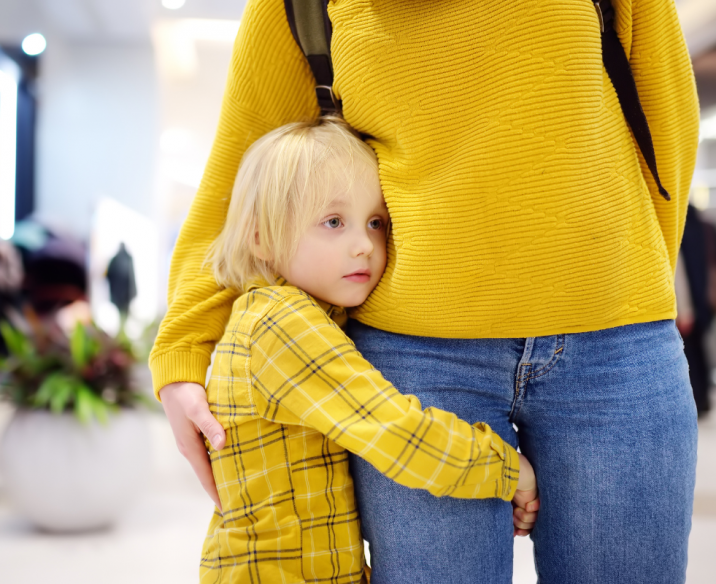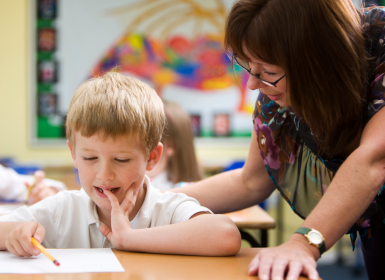
Starting preschool, kindergarten or a new primary school is a very exciting time but it can cause anxiety for some children. Separation anxiety is very common at these junctures, especially when children haven’t yet been apart from their parents for long stretches of time during the day.
The signs of separation anxiety
Be aware that some level of anxiety is developmentally normal – everyone experiences it at some level in unfamiliar situations. A new environment, with new people and new routines can be challenging for children.
You might notice that your child is sweaty, shaky, talking really fast or unable to concentrate properly. These too can be symptoms of anxiety. Anxiety can also present as a tantrum or challenging behaviour, either at home or at the school door. An inability to sleep or eat properly because of excess worrying, could also indicate high anxiety about the new chapter that is about to begin.
Michelle Button, Educational & Developmental Psychologist at Learning Links, says that because children often don’t have the vocabulary to describe their anxious feelings their symptoms often present as a physical problem: a tummy ache, a headache, a rapid heartbeat, hyperventilation, or even a panic attack. If they are complaining of physical symptoms try asking them about any worries they may have, and discuss with your GP to rule out any other underlying medical conditions.
Strategies to cope with separation anxiety
When you know your child is likely to feel anxious without you during the day, the best thing you can do for them is teach them strategies that will help them regulate their emotions and behaviours.
Five Finger Strategy
One strategy recommended by Michelle Button is the five finger strategy: each finger represents an action that children can take to help themselves in a difficult moment. There are hundreds of different techniques that you can teach your child. Find five that work for them and remind them to use these whenever they start to feel worried or upset at school.
Here are some ideas:
- Talk to a teacher
- Talk to a friend
- Take five deep breaths
- Find a safe space for some time out
- Do a progressive muscle relaxation exercise
DOWNLOAD OUR MY CALM HAND COLOURING SHEET TO CREATE YOUR OWN FIVE FINGER STRATEGY TOGETHER
The Zones of Regulation
Teaching children how to use the Zones of Regulation can help them in times of high anxiety. The framework uses colours to help children identify their feelings, similar to traffic lights. Once children understand the signals their body is giving them, they are on the path towards improved emotional regulation.
For example:
In the Red Zone people are experiencing anger, terror or devastattion.
In the Yellow Zone people are experiencing high emotions, stress, frustration, nerves and anxiety.
In the Green Zone people are experiencing a sense of calm. This zone is optimal for learning as the child is happy, focused and content.
In the Blue Zone people are experiencing sadness, sickness or even boredom.
The Grounding Technique
Another coping strategy you can teach your child is this Grounding Technique which uses the five senses to help them focus on something other than their distress. Children can look around them and find things to see, feel, hear, smell and taste.
Visualisation Strategy
The last strategy Michelle Button recommends is to teach your child how to use their imagination in a difficult situation. Encourage your child to stop, close their eyes, and imagine that they are in their favourite place; the beach, near a river, their bedroom, or your own garden.
Comfort Items
Some parents give their children an item which helps maintain their connection from a distance. i.e. a small toy they can keep in their pocket that they can touch if they need the reassurance of something from home. A stress ball or fidget toy could also help a child with separation anxiety.
What YOU can do to help manage your child’s expectations
New environments or situations can provoke anxiety in children. Michelle suggests that a walk-through of the school day routine could help increase your child’s confidence. Knowing what the school or childcare setting looks like, and understanding some of the processes can be very helpful for your child.
However, at some schools, parents are no longer able to enter the school grounds, to minimise the number of people mixing, so you may not be able to walk your child right to the door of their classroom. Knowing the rules around this will help you to prepare your child well for their first day.
Here are some things to try:
- Practice driving or walking to the school, and around the school so entries and exits are familiar
- Make sure your child knows what the routine will be. i.e. they’ll be dropped at the gate/the classroom with a big hug and kiss and then they will go inside with a teacher
- Talk about the kinds of activities they might do in the classroom with their teachers and their classmates
- Practice eating their lunch from a lunchbox
- Reassure them about pick up plans. Tell them who is picking them up and where they should be meeting. If they are going to After School Care, make sure that they know the processes and procedures for getting there.
- If possible, plan to meet up for a play with other children who will attend the school so they will see some familiar faces when they start
- Read stories about starting school and talk about the people, environments and activities in the stories that may be the same.
Speak about your own positive experiences at school and help your child get excited about the adventure that they are embarking upon. Talk about the friends you made, the fun things you did, the excursions you went on and all the thousands of opportunities you had to learn new and wonderful things.
Acknowledge how they are feeling and that is ok to feel nervous. Remind them of the strategies above to feel better.
How to manage YOUR OWN emotions
Teachers are experienced at dealing with first week nerves and anxiety. Trust in them. They can support and comfort your child if needed and meet their needs. The best thing you can do to help is make a confident, quick exit. Reassure your child that they will be safe and that you will be there at the end of the day.
It’s ok to feel upset, especially if it’s your youngest child who is going off to school. You might be worried about how your child will cope with school, whether they will fit in or enjoy the classroom experience. Your life is changing and you are facing unfamiliar challenges too. However, it’s important to avoid showing your child too many emotions at this time. Your anxiety as a parent can feed the anxiety of your child. Cry in your car (if you need to) or with the other mums and dads once school has started.
Even if you think you are feeling confident about this moment, prepare yourself for any possibility when it comes to your child’s behaviour on the first day.
Offer an activity to look forward to after school
Knowing that their parents are looking forward to having some special time with them after school can give children something positive to look forward to each day. Once the school term gets into full swing, the afternoons can be busy so Michelle recommends scheduling some time into your diary every day, as you would any other appointment, for a debrief about school and a dedicated moment to spend with your child. This could be during a play at the park, a treat at the ice cream shop or while you’re reading a book together.
If it’s in your routine, you won’t miss it and you’ll be able to maintain your awareness of your child’s state of mind.
Separation Anxiety Disorder
A degree of separation anxiety is usual in children who are starting school. When this anxiety persists beyond the second term of school and it’s impacting a child’s life and friendships, it could be Separation Anxiety Disorder and you should seek support from a doctor or psychologist.
When children are presenting with a Separation Anxiety Disorder they become extremely worried or distressed when away from their parents or caregiver. Older children may fear that something bad may happen to their loved ones while they are absent. They may refuse to go to school or even leave the house without their primary caregiver.
Separation anxiety is the only anxiety diagnosis that is childhood based but with the right strategies it can be managed and resolved so that children can flourish during this new stage of their life.
How Can Learning Links Help?
Learning Links offers a range of resources and services that can provide additional support for children experiencing separation anxiety.
Psychological Therapy – Children who present with separation anxiety may benefit from speaking with a psychologist who can help your child understand their feelings and provide them with coping strategies to help them manage their anxiety. Read more >
Group Programs – Learning Links offers specific anxiety-based small group programs such as ‘Take Action’ and ‘Zones of Regulation’. Our group programs are available during school terms and during the school holidays. Each program teaches children practical strategies to cope with their anxiety and regulate their emotions.



